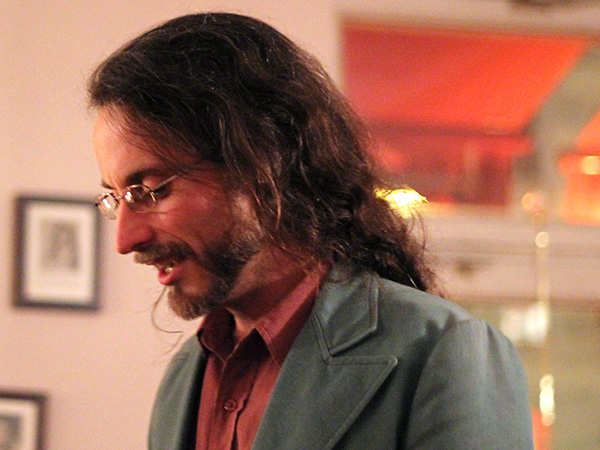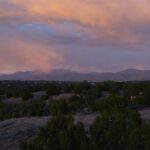A SCIENTIST’S LAMENT
★ ★ ★ ★

By Cameron Wilson
From birth, we, like all animals, behave rather like scientists. We learn through repeated experiment and observation, build conceptual models of our world and ourselves and then verify them through repeated, independent experiences. Most of it works pretty well: we learn to move, to grip, to walk, to talk. We learn about gravity and the varied strength of different materials.
At some stage, though, we reach the limits of how much we’re willing and able to learn. From this, we reach the troubling fact that knowing and believing don’t necessarily occupy the same territory. It comes down to trust. I trust the scientific method, the way it requires multiple lines of evidence and inquiry to converge for a conclusion to be accepted as the truth. To me, this framework to evaluate multiple observations, multiple pieces of sometimes conflicting evidence, is one of the greatest tools yet invented. However, others do not trust it, maybe because they misunderstand science or because their trust is steadfastly in a certain ideology or in a faith as the “fountain of truth”.
There is currently nowhere in which immovability in the face of overwhelming, verified, converging evidence is more frightening than the issue of climate change. This is the most important global problem to me, because it is one that we can’t legislate or buy our way out of if we get our response wrong. For me, climate change spotlights how (in affluent countries, at least) science has dramatically changed our ways of life, but not necessarily our ways of thinking.
It suggests that we, collectively, don’t really understand how scientific research works, and also forces us to confront some hard questions about why our governing beliefs can be so resistant to new information.
We don’t seem very good at evaluating risks versus benefits. We seem unswervingly convinced that fossil fuels and eternal economic growth are both necessary and undeniably good, without requiring any particular standard of proof. But when told we are on track to bringing about our own imminent demise, we demand proof to the level of absolute truth, explained comprehensively yet concisely and simply. This dismays me partly because I know the rigour scientists demand of each other. Research is a competitive endeavour. Funding is scant, so looking for fault with your opponents’ work is as much a survival strategy as it is part of the method for getting to the truth. Why is science’s converging evidence unconvincing, while there is more-or-less blind faith in the wisdom and benevolence of the private sector—those making profits from us—and in economic doctrines, even in the face of extensive contrary evidence? Is it that ideologies just have better marketing than science?
I struggle to understand the attacks on climate science. The combination of the urgency of the issue and enormity of its consequences sets my heart pounding whenever I am faced with spurious arguments and government inaction (or barely concealed corruption). To me, it is simply intuitive that the scientific method is the best way we have of understanding the world around us; its effectiveness is demonstrated all around us. So I can’t grasp why anyone would think otherwise, or why anyone would be convinced an entire field of independent and competing researchers is defrauding the civilised world.
It’s easy to despair in the face of climate change denial. What I find encouraging, though, is that we don’t need to wait for political solutions. Think-tanks like the Rocky Mountain Institute and Beyond Zero Emissions are proving that renewable energy and good design can already ween us off fossil fuels entirely without radically changing our lifestyle. (Although Naomi Klein makes the good argument that it’s a good opportunity to fix that, too). Thousands of grassroots organisations and municipalities are making changes locally, changing “it can’t be done” into “we’re doing it”. And even big business is recognising that the changes we need make good economic sense, e.g. Google’s plan to run entirely on renewable energy next year, Elon Musk’s growing technological empire, and how the growth of cheap renewable energy and the divestment movement are eroding the profitability of fossil fuels. And philanthropists like Sir Richard Branson and Bill Gates are showing that the wealthy can stand for more than just making more money.
Progressive grassroots action, however small and localised, has an encouraging effect on our collective conversation. When we see benefits for our neighbours, it lowers the barrier for us to make similar changes. Above all, I think we need to shift our public and political discourse towards this question: what kind of society do we want to be? We need to have this conversation, even though (and perhaps partly because) that’s hard in a fundamentally individualistic culture. It has potential to be inclusive, positive, empowering, energizing. For a start, it recognizes that we are a society. I want us to all be having this conversation, with all sorts of people, and for it to be the primary focus of every election campaign—that, and how the candidates propose to progress towards that society. For now, it’s assumed and implied. I’d like to see it out in the open, with its assumptions and implications laid bare. Even if I don’t like the majority answer, at least it would be honest.
That won’t fix everything, of course. It doesn’t resolve the problem of arguments in which each side has fundamentally different beliefs and standards of proof. It doesn’t mean we’ll all suddenly understand each other and act united towards an undisputed common good. But it does let us do something.
This is all just me, thinking. Working in science has taught me how little I know, how little I can be certain about. That’s part of why I find it stressful to commit un-researched ideas like these to print. But I think there is a value in uncertainty in public discourse. I like how scientific endeavour means accepting that what we know is growing all the time. I hope our society can grow with it.

Cameron Wilson is the poetry editor of The Wild Word magazine. He is a performing poet, medical engineering researcher, gardener, and occasional guitarist. Originally from Brisbane, Australia, he currently lives in Missoula, U.S.A.























